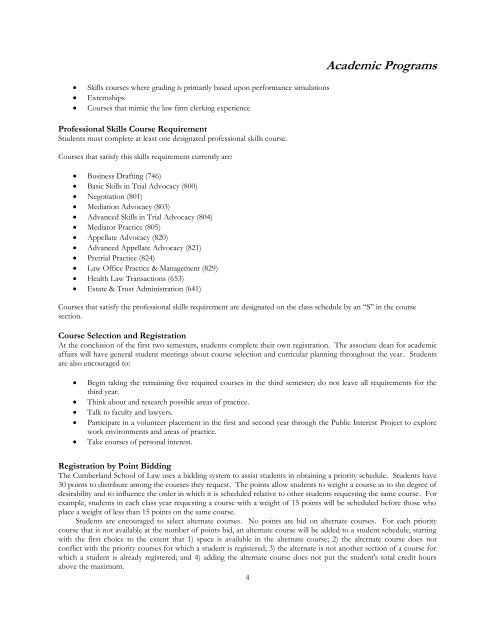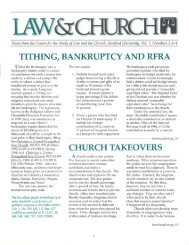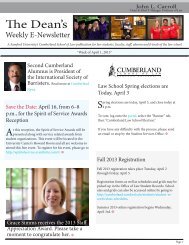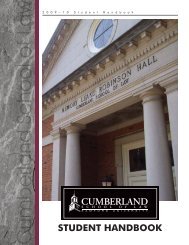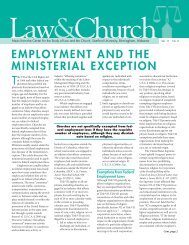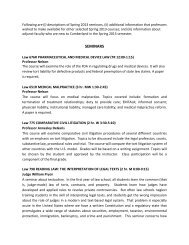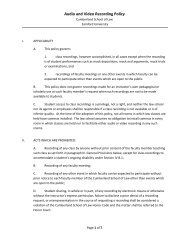STUDENT HANDBOOK - Cumberland School of Law - Samford ...
STUDENT HANDBOOK - Cumberland School of Law - Samford ...
STUDENT HANDBOOK - Cumberland School of Law - Samford ...
You also want an ePaper? Increase the reach of your titles
YUMPU automatically turns print PDFs into web optimized ePapers that Google loves.
Skills courses where grading is primarily based upon performance simulations<br />
Externships<br />
Courses that mimic the law firm clerking experience<br />
Pr<strong>of</strong>essional Skills Course Requirement<br />
Students must complete at least one designated pr<strong>of</strong>essional skills course.<br />
Courses that satisfy this skills requirement currently are:<br />
Business Drafting (746)<br />
Basic Skills in Trial Advocacy (800)<br />
Negotiation (801)<br />
Mediation Advocacy (803)<br />
Advanced Skills in Trial Advocacy (804)<br />
Mediator Practice (805)<br />
Appellate Advocacy (820)<br />
Advanced Appellate Advocacy (821)<br />
Pretrial Practice (824)<br />
<strong>Law</strong> Office Practice & Management (829)<br />
Health <strong>Law</strong> Transactions (653)<br />
Estate & Trust Administration (641)<br />
Academic Programs<br />
Courses that satisfy the pr<strong>of</strong>essional skills requirement are designated on the class schedule by an “S” in the course<br />
section.<br />
Course Selection and Registration<br />
At the conclusion <strong>of</strong> the first two semesters, students complete their own registration. The associate dean for academic<br />
affairs will have general student meetings about course selection and curricular planning throughout the year. Students<br />
are also encouraged to:<br />
Begin taking the remaining five required courses in the third semester; do not leave all requirements for the<br />
third year.<br />
Think about and research possible areas <strong>of</strong> practice.<br />
Talk to faculty and lawyers.<br />
Participate in a volunteer placement in the first and second year through the Public Interest Project to explore<br />
work environments and areas <strong>of</strong> practice.<br />
Take courses <strong>of</strong> personal interest.<br />
Registration by Point Bidding<br />
The <strong>Cumberland</strong> <strong>School</strong> <strong>of</strong> <strong>Law</strong> uses a bidding system to assist students in obtaining a priority schedule. Students have<br />
30 points to distribute among the courses they request. The points allow students to weight a course as to the degree <strong>of</strong><br />
desirability and to influence the order in which it is scheduled relative to other students requesting the same course. For<br />
example, students in each class year requesting a course with a weight <strong>of</strong> 15 points will be scheduled before those who<br />
place a weight <strong>of</strong> less than 15 points on the same course.<br />
Students are encouraged to select alternate courses. No points are bid on alternate courses. For each priority<br />
course that is not available at the number <strong>of</strong> points bid, an alternate course will be added to a student schedule, starting<br />
with the first choice to the extent that 1) space is available in the alternate course; 2) the alternate course does not<br />
conflict with the priority courses for which a student is registered; 3) the alternate is not another section <strong>of</strong> a course for<br />
which a student is already registered; and 4) adding the alternate course does not put the student's total credit hours<br />
above the maximum.<br />
4


